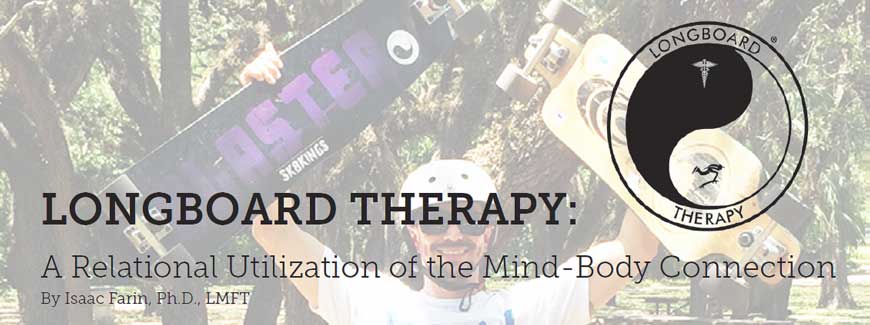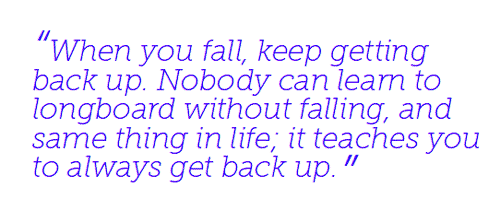
A few years ago I 
developed a therapeutic intervention called Longboard Therapy. Since first coming up with the approach, I’ve had the privilege of meeting and speaking with many amazing, dynamic individuals in the longboarding world.
Their passion for the sport is real, genuine, welcoming and full of stoke! But it isn’t just the physical aspect of the sport they’re passionate about; everyone I’ve spoken to has shared enlightening perspectives on the importance of the mind-body connection in the sport of longboarding. In other words, they fully relate to the metaphor of longboarding that first inspired me to create Longboard Therapy.
Here are a few examples:
Joner Strauss, founder of SkateIDSA, shared with me that “longboarding allows for the mindful flow we are all looking for in our lives.”
Don Tashman, CEO of Loaded Longboards, told me he sees the mind-body connection and relational approach of longboarding “as a transcendental experience (at least potentially). Full engagement in movement, flow, grace and heightened senses extracts you from your current mindset and everyday challenges.” Tashman went on to say, “My personal belief is that the act of harnessing G-forces to overcome pedestrian experiences of gravity expands the mind and one’s relationship with the physical world.”
Andy Andras, the Guinness World Record holder for distance traveled on a skateboard in 24 hours, said, “I skate long distance because my longboard has become the friend I really know and speaks to me in a language I understand. The act of pushing my longboard has made me aware of my deeper thoughts, ideas and feelings, as well as the sensations and joys of the movement of my body.” He added, “The farther I skate, the more time I have to make this amazing connection with myself.”
All of those people are dedicated skaters who love the sport and the community. Though each of them participates in the industry in unique ways, they all agree that when it comes to longboarding, there’s much more to it than meets the eye.
There’s great metaphorical value in the sport of longboarding. I came up with the idea of incorporating longboarding into some of my psychotherapy sessions with clients when I could no longer deny that longboarding was my biggest stress reliever after long hours of work at my practice. I felt compelled to share the stoke and flow I was personally experiencing with my clients. And I was confident that longboarding would add depth to the therapeutic experience, giving each client a unique experience of those incredible feelings.
Since first creating Longboard Therapy, I’ve used it with over 50 clients ranging in age from 8 to 50. As varied as their ages have been, so too have been their therapeutic symptoms and goals. They’ve included anxiety, depression, grief and loss, trauma, phobias, occupational transitions, life transitions, anger issues, ADD and ADHD, relational issues, family issues, addictions and academic issues. Through longboard therapy, I’ve helped my clients cultivate mindfulness and awareness, generate mind and body healing, boost confidence, achieve sports-related goals and develop overall life balance. The results have been rather spectacular, and I’ve received many testimonials from my clients, some of which you can see on my website, isaacfarintherapy.com or longboardtherapy.com. Although each of my clients sets unique goals for Longboard Therapy, they all share in common the ability to utilize what they experienced when learning to longboard and apply it to achieving particular goals in their lives. The metaphor of Longboard Therapy is very apparent to them, and they can clearly see how they can apply it to their lives, in both intrapersonal and interpersonal ways.
Most recently, I’ve been working with a 14-year-old boy named Evan, who took it upon himself to participate in Longboard Therapy once a week. His goals for therapy were to find a better balance among his academics, social relationships and sports while increasing his overall focus and energy.
When he first came to me, his lack of balance was straining his communication with his parents and causing him to waste long stretches of time zoned out with his electronic devices.
Evan recently shared some awesome insights from his experience with Longboard Therapy:
– “Longboarding helps me both physically and mentally.”
– “I feel better while exercising and sweating – I feel in the flow.”
– “When we talk while we skate, it helps me relate my life to longboarding – for example, living a more balanced life.”
– “The metaphor is balance: school, sports, social life.”
– “I am receiving outlooks for how to make my daily life better, so I can live a happier life.”
– “When you fall, keep getting back up. Nobody can learn to longboard without falling, and same thing in life; it teaches you to always get back up.”
– “Falling and almost falling also teaches me that I would have made this mistake another time in the future, so I am able to correct some things now to correct that: future learning.”
– “In longboarding, you can take it at your own level. You can skate for fun, use it for transport, use it for tricks or just discover your own way.”
– “I prefer this method, because I can do a sport that I love while resolving life problems.”
Evan has made some fantastic strides toward his initial goals. He is much more open, focused and balanced, and his parents have recently attested to this as well. They’re all grateful that Evan has the opportunity to work on his mind-body connection and relational goals in such a dynamic and experiential psycho-therapeutic atmosphere . . .such is Longboard Therapy.
The connections we tap into through longboarding are powerful and universal. We can all extract unique metaphors from our experiences while also recognizing common themes and perspectives that unite our experiences. This is what makes longboarding so special. Who knew that experiencing the world on a piece of wood with four wheels could be so deep!
Longboard Therapy with Isaac Farin – featured in The Miami Herald.
Special thanks to Michael Brooke from Concrete Wave Magazine.
